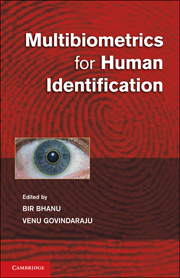Introduction
Published online by Cambridge University Press: 25 October 2011
Summary
Biometric systems are increasingly being used in many applications that require positive identification of individuals for access authorization. Traditional biometric systems rely on a single-biometric, single-sensor paradigm for authentication or identification. For high-security and real-world requirements, this paradigm is inadequate when it comes to reliably providing a high level of accuracy performance. Multibiometrics, the technique of using multiple biometric modalities and sensors, promises to rise to the challenge of making biometric authentication truly robust and reliable. Moreover, using multiple biometrics enhances the coverage of the section of the population that is not able to provide any single biometrics. Multiple biometrics is naturally more robust against spoof attacks as well, since hackers have to contend with more than one biometrics. Further, fusing multibiometrics enables indexing of large databases for identification of individuals.
Compared with other books on the same topic, the key features of this book are the following:
It includes the entire gamut of multibiometrics topics, including multimodal, multisensory levels of fusion, multiple algorithms, and multiple data acquisition instances.
It includes chapters on the latest sensing devices for novel multibiometrics modalities, security assessment of multibiometrics systems and their dynamic management, and theoretically sound and novel approaches for fusion.
It provides information on publicly available multibiometrics databases and addresses research issues related to performance modeling, prediction, and validation of multibiometrics systems.
Information
- Type
- Chapter
- Information
- Multibiometrics for Human Identification , pp. 1 - 6Publisher: Cambridge University PressPrint publication year: 2011
